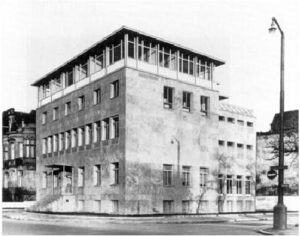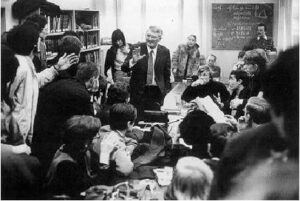Institute, School, Tradition: On the Centenary of the Frankfurt School
In 2023 we were celebrating the centenary of the so-called Frankfurt School. However, there is a semiotic slippage in this terminology. First, there was the Institute for Social Research, then the moniker of the Frankfurt School was coined, and then this was associated with the vague and wide: “Critical Theory.” There would not have been a Frankfurt School and Critical Theory without the Institute. The Institute, as we now know was endowed generously by the Weils, father and son. However, before I move to an analysis of what the distinctions among Institute, School and Tradition as they related to the so-called Frankfurt School, I want to note some contrasts. The first contrast would be with France, where there is the famous Collège de France. This is a state institution, funded by moneys from the Government. Yet, arguably, the Collège is there to uplift their Intellectual stars. This is an institution built to foreground individuals. Each thinker is sui generis. There is no school, and perhaps not even a tradition, only that such and such was a member of the Collège. The second contrast would be with the United States, where we do have institutes, but they are not driven by a specific agenda, but by individual research projects. We mostly have departments, and these are not schools, although some maybe known for having several specialists on a certain topic: Ancient Philosophy, Contemporary Philosophy, Critical Race Theory, Feminist Philosophy, and so on. There is perhaps a third contrast, with the “Madrid School.” This is the school that gave us some of the most important Spanish philosophers: Ortega Y Gasset, José Gaos, Javier Marías, and others. The Madrid School, like the Institute for Social Research was exiled. Most of the Madrid School went to Latin America, mostly Mexico and Venezuela. As exiles they became a major impetus for Latin American philosophy. Gaos, for instance, had an incredible impact on Mexican philosophy.

The Institute for Social Research (ISR) was founded in 1923, and it opened in 1924. The original charge was for the Institute to do research on worker’s movements and life. This required a lot of empirical research. Most of the original members were Jews from Germany. We often forget that the ISR was charged with this specific kind of empirical research, given what we think “Critical Theory” has become. When the first director of the Institute passed away shortly after being named director, Max Horkheimer was appointed as director. His appointment was unusual, as he did not do empirical research. However, he was a good choice as he was interested and working on “Bourgeois Society” and its morality. Horkheimer was an incredibly competent administrator. He oversaw the endowment of the Institute and made sure that it was safe. As it is known he moved the endowment to England and then to the U.S. This endowment allowed the Institute to support intellectuals and researchers abroad during their exile. The Institute even supported Ernst Bloch, who was peripherally related to it. Today, the IFS is financed by the State of Hesse and the City of Frankfurt. This is evident in the impressive building on Bockenheimer Strasse that houses it. At one time, the philosophy department was around the corner from the Institute’s building. However, the philosophy building on Dante Strasse was demolished and the department was moved to a high rise, alienation to the nth power.

With Horkheimer’s leadership a whole new set of scholars became associated with the Institute: Adorno, Marcuse, Lowenthal, etc. They were not empiricists, but philosophers. While they were not sociologist, in the strict sense, they were all historical materialists, that is, they wanted to understand how material conditions influence the outlook of society. Above all, they wanted to study and understand the way in which all culture reflects those material and social conditions. We may call this a second generation. What is notable is their theoretical turn. It is to this second generation that we can assign the name of “School.” They defined for us what is the Frankfurt School. At one point, before the University of Frankfurt move to its super modern West End Campus, its offices we housed in the center of the city. There was, maybe there is still, a major mural of Adorno adorning the walls of the campus.

Photo by Jeremy J. Shapiro
We could speak of a third generation of the Frankfurt School. This would be constituted by Karl-Otto Apel, Jürgen Habermas, and Axel Honneth. Apel is not generally acknowledged as a member of the Frankfurt School, although he taught there for two decades, and his Transformation of Philosophy (1973) is one of the richest works of philosophy and social theory of the last century. It is with Apel that Critical Theory makes the “Linguistic Turn.” This turn was taken to new levels by Habermas’s impressive work. This is not the place to go into the details of Habermas’ philosophical trajectory, from hermeneutics to philosophical anthropology, to the theory of communicative action, to most recently a massive “history of philosophy,” from antiquity to Hegel. Honneth also has an impressive bibliography. He contributed to the animating questions of Critical Theory, namely what does social agency mean and entail, how is moral consciousness possible, and how there is dignity in work, the theme of his forthcoming book. There probably is a fourth generation, but I would be remised if I mislabeled them.
Notwithstanding their diversity and the generations, one could argue that the Frankfurt School has stablished a tradition. In one way or another all the thinkers associated with the IFS shared a commitment to historical materialism, immanent critique, phenomenology, aesthetics and literary criticism, broadly construed. They are all committed to normativity and historically grounded critique. In his new book, A Precarious Happiness: Adorno and the Sources of Normativity (2023) Peter Gordon talks about “normative surplus” as what the Frankfurt School, and Adorno in particular, aimed to disclose. Gordon’s elegant and detailed analysis of Adorno’s ideas about normativity are incredibly informative. Inchoate in his analysis if the idea of “precarious normativity,” or the “precariousness of normativity.” Here recent ideas and discussions by Rainer Forst, Rahel Jaeggi and Peter Niese on “regression” are extremely important. The basic idea is that we may regress behind our normative accomplishments.

I do want to register some complaints and reservations. The first generations of Critical Theory were inattentive to race, other than they discussed anti-Semitism. There is hardly any discussion of anti-Black or anti-Latino racism, although the second generation was exiled in New York and California, before the Civil Rights Movement and the dismantling of Jim and Jane Crow. In tandem, there is little analysis and discussion of colonialism or what now we refer to as the “coloniality of power.” Additionally, the first generation of “Critical Theory” were philosophical male chauvinists. I have not seen any serious discussion of the role of women in the first three generations. Gretel Adorno, for instance, kept his papers and manuscripts in order, and she went on to edit his posthumous works. It is only when Critical Theory comes to the U.S. that we get some feminists, such as Sheila BenHabib, Nancy Fraser, Nancy Love, Amy Allen, and so many other great feminists.
What are the lessons to learn from an Institute, a School, and a Tradition? I think a key lesson is that under the leadership of very adroit managers, they managed to keep an endowment that sustained the members of the IFS over nearly two decades during their exile. The themes of displacement, exile, and Heimkehr (Return Home) became key to all the members. There was and there is a tremendous amount of intellectual loyalty. The letters among Adorno, Horkheimer, Benjamin, Bloch are examples of this type of loyalty that perhaps is part of a bygone era. Evidently, they were all great stylists, great writers of criticism and philosophy, ranging in genres from aphorism to heavy tomes of philosophy and its history. As a tradition, they were all committed to what Habermas went on to called “reconstructive” history or reconstructive intellectual history. At the heart of this methodological approach is the idea that any critical and immanent analysis must be able to give an account of its own sources. This means: how is it possible for me to make these critical claims, i.e. what are my normative grounds? Finally, and surely not to be neglected is the materiality of philosophical productivity and creativity. The IFS sustained its members through some of the darkest decades of the twentieth century. Now, it has become a global force with delegates across the world. It is not difficult to read any Adorno, Horkheimer, Habermas, et. al. and admire the thinking and writing. A hundred years and counting.

